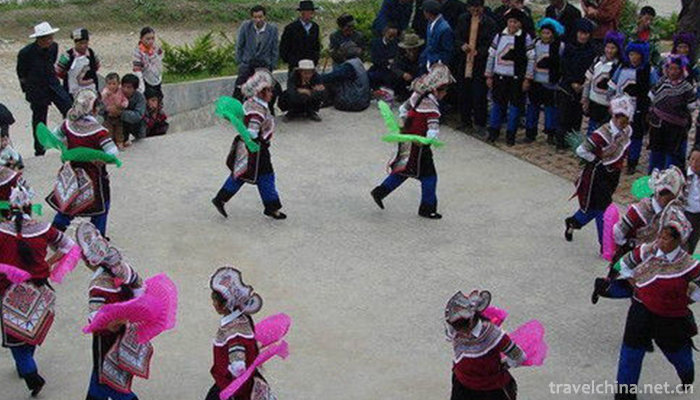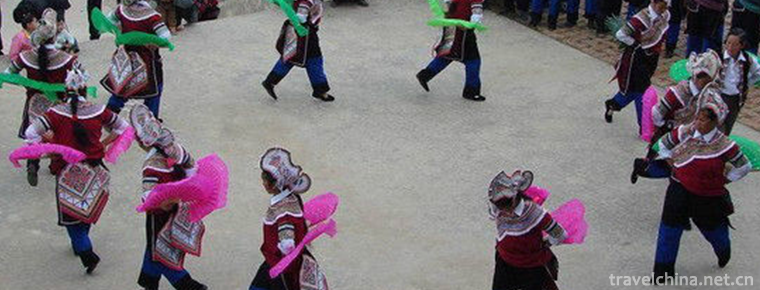Music dance
Music dance
Musical dance is popular on the South Bank of the Red River, so it is also known as "Jiangwai" Yi dance. The Yi language is called "Zai Bi", which means jumping up in pairs. The local Han people call this dance "Longzheng", which is also considered a joyous action, so it is also called "music". Musical dance is quite similar to dragonfly dance, so there is also called "dragonfly dance".
On June 7, 2008, the music and dance declared by Honghe County of Yunnan Province was listed in the second batch of national intangible cultural heritage list with the approval of the State Council.
historical origin
This is a kind of traditional self-entertainment group dance. Men can dance from young to old. Women can't dance after they become mothers. "Music" is one of the main entertainment activities for young men and women, so they can jump at any time. In traditional Yi programs, such as Lunar New Year's Eve on December 30 and Torch Festival on June 24, they often have to jump for several days; in wedding, funeral and sacrificial activities, they must also jump.
artistic characteristics
Music and dance is a form of singing and dancing, which is closely combined with instrumental music and dance. There is no limit to the number of people participating in the dance. Most of them are in double numbers around the circle. When dancing, there is a certain procedure. Before dancing, it begins with Lyric singing, accompanied by a band. The band members do not participate in the dance, but shake their bodies with the accompaniment's rhythm and help them to enjoy themselves with a high voice.
The dance is gentle and light, knee flexion and elasticity, dancing arms and dragonflies flapping wings, graceful posture, rich characteristics. Dancers sing while dancing, sometimes clap their hands, wear each other when they are intense; stop, move, and turn around. Graphics are basically circles, sometimes interlaced with each other, sometimes turning around and turning around. When we are happy, we still sing the song "Thiazide, Thiazide, Thiazide".


-
2.Fujian earth building (Fujian Tulou)
Fujian Tulou is also called "Hakka Tulou" because most of it is built by Fujian Hakka people. Tulou came into being in Song and Yuan Dynasty and matured in the late Ming
Time 2018-12-08 -
3.Peace Hotel Shanghai
Peace Hotel is a landmark building in Shanghai. Located at No. 20 East Nanjing Road, Huangpu District, Shanghai, it is the first modern building in the history of modern architecture in Shanghai
Time 2018-12-16 -
4.Korean Huajiali
The flower armor ceremony of the Korean nationality is one of the important rituals of the Korean nationality's birthday ceremony. Since ancient times, the Korean people have regarded respecting the e
Time 2019-04-16 -
5.Talking about ancient times
Telling the ancients means telling books and stories. It is a traditional language performing art form in which ancient artists use Quanzhou dialect in Minnan language to re-create and deliver novels
Time 2019-05-05 -
6.Wooden Fish Songs
Muyu song is short for Muyu, also known as Touyu song. It is one of the traditional rap and singing arts in Guangdong Province and belongs to the system of Tanci. It is popular in the Pearl River Delt
Time 2019-06-06 -
7.Pangu Myth
Pangu myth, the local traditional folk literature of Tongbai County and Biyang County in Henan Province, is one of the national intangible cultural heritage.
Time 2019-06-08 -
8.Pipa Art
In the history of modern Chinese traditional folk music, there are two schools of pipa: the "Shanghai School" (Pudong School) and the "Zhejiang School" (Pinghu School). The Pipa ar
Time 2019-06-09 -
9.Jumping Cao Gai
Caogai jumping is prevalent in Baima Tibetan area of Pingwu and Nanping counties. It is held on the sixth day of the first month of the lunar calendar every year. Cao Gai is a Baima Tibetan phonetic t
Time 2019-06-21 -
10.Wuyin Opera
Wuyin opera has a history of nearly 300 years. Its singing style is graceful and charming. It is known as "Northern Yue Opera". Its occurrence, development and finalization have gone through
Time 2019-06-29 -
11.Yi Medicine Water Plaster Therapy of Yi Medicine
Yi medicine is the summary and wisdom crystallization of the Yi people's long-term struggle against disease, and it is an important part of the great treasure house of Chinese medicine. There are thou
Time 2019-07-12 -
12.Introduction to Chinese embroidery
Embroidery, known as needle embroidery in ancient times, is a kind of technology that uses embroidery needle to guide color thread, embroiders the designed patterns on textiles, and forms patterns with embroidery traces. In ancient times, it was called "Juju" and "pinju".
Time 2020-12-12